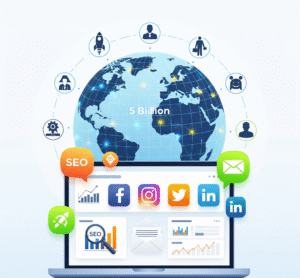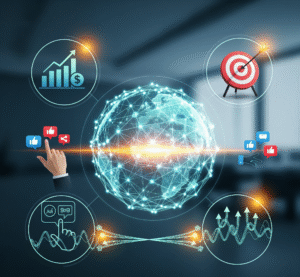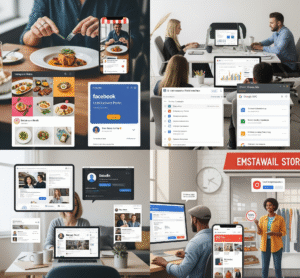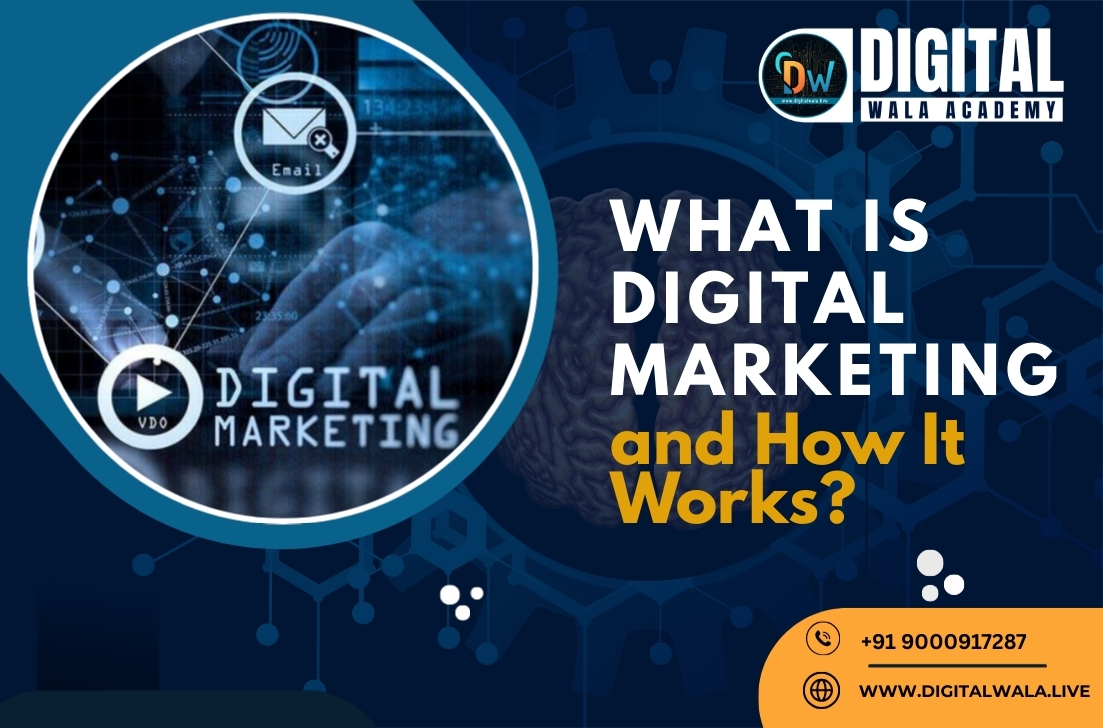What is Digital Marketing and How It Works? A Complete Beginner’s Guide
In today’s fast-paced online world, digital marketing has become more than just a buzzword—it is the backbone of modern business growth. Whether you are a startup, an established company, or an individual trying to build an online presence, knowing what is digital marketing and how it works is crucial.
With more than 5 billion internet users worldwide, consumers spend a significant amount of time online, searching for products, services, and solutions. Businesses that understand how digital marketing works for beginners can leverage cost-effective strategies to reach the right audience, generate leads, and boost sales.

What is Digital Marketing?
At its core, digital marketing refers to promoting products, services, or brands using digital platforms and technologies. Unlike traditional marketing methods such as TV, radio, and print, digital marketing leverages the power of the internet to reach a global audience.
Some common digital marketing channels include:
-
Search Engine Optimization (SEO): Optimizing websites to rank higher on Google and other search engines.
-
Pay-Per-Click (PPC) Advertising: Paid ads on platforms like Google Ads or Bing.
-
Social Media Marketing: Promoting products or services via platforms like Facebook, Instagram, LinkedIn, and Twitter.
-
Content Marketing: Creating blogs, videos, and infographics to engage and educate your target audience.
-
Email Marketing: Sending personalized messages to prospects and customers.
-
Affiliate Marketing: Partnering with affiliates to promote your business in exchange for commissions.
-
Influencer Marketing: Collaborating with influencers to market products.
In simple terms, digital marketing is all about reaching the right audience, at the right time, with the right message—using online channels.
How Digital Marketing Works for Beginners
If you’re new to this field, you may wonder: How does digital marketing actually work?
The process involves several interconnected steps:
-
Understanding Your Target Audience
Every successful digital marketing campaign starts with knowing your customers—who they are, their pain points, needs, and preferences. -
Building an Online Presence
This means creating a professional website, setting up social media profiles, and optimizing them for search engines. -
Attracting Visitors through SEO & Content
By applying SEO techniques such as keyword research, on-page optimization, and link building, businesses can increase organic traffic. Blogs, videos, and guides add value and attract visitors. -
Engaging with Customers via Social Media
Social platforms are powerful tools for engaging with potential customers through posts, reels, stories, and ads. -
Converting Leads into Customers
Once you attract traffic, the next step is conversion. Tools like landing pages, call-to-actions, and email campaigns help turn visitors into paying customers. -
Measuring and Optimizing Results
Digital marketing is data-driven. Using tools like Google Analytics, businesses can track website traffic, conversions, and campaign performance. This allows continuous improvement.
So, when we talk about how digital marketing works for beginners, it’s a cycle of attracting, engaging, converting, and retaining customers—all powered by data insights.
Benefits of Digital Marketing
Digital marketing is not just a trend; it’s a necessity. Let’s explore some of the key benefits of digital marketing:
1. Cost-Effective
Compared to traditional advertising, digital marketing is affordable and provides measurable results. Even small businesses with limited budgets can compete with bigger brands.
2. Global Reach
With just a website or social media page, businesses can reach customers worldwide—something not possible with traditional methods.
3. Targeted Audience
Unlike TV ads that reach everyone, digital marketing allows you to target specific demographics, interests, and behaviors.
4. Measurable Results
Every click, impression, and conversion can be tracked in real time. This helps businesses understand what’s working and what needs improvement.
5. Higher Engagement
Social media and content marketing encourage direct interaction with customers, building long-term relationships.
6. Flexibility and Scalability
Digital campaigns can be adjusted instantly. You can start small and scale up once you see results.

Digital Marketing for Small Businesses
One of the most significant advantages of digital marketing is its accessibility to small businesses. In the past, only large corporations could afford mass media advertising. Today, even a local shop can grow its business online.
Here’s how digital marketing for small businesses makes a difference:
-
Increases Visibility in Local Searches
With the rise of “near me” searches, local SEO helps small businesses appear in Google results when customers search for products or services in their area. -
Builds Brand Awareness
Through social media campaigns and content marketing, small businesses can showcase their unique identity and build trust among customers. -
Drives More Sales
Small businesses can use PPC ads and promotions on platforms like Facebook and Instagram to attract leads and convert them into customers quickly. -
Provides Affordable Marketing Options
Even with limited resources, small businesses can use tools like email marketing and SEO to compete with larger competitors. -
Encourages Customer Loyalty
By staying connected with customers through personalized campaigns, small businesses can build strong and lasting relationships.
Examples of How Digital Marketing Works in Real Life
To better understand what is digital marketing and how it works, let’s look at some real-world examples:
-
A restaurant can use Instagram reels, Facebook ads, and Google Business Profile to attract local customers.
-
An e-commerce startup can use SEO blogs, influencer partnerships, and PPC ads to boost sales.
-
A freelancer can build a personal brand by writing blogs, optimizing LinkedIn, and networking on social media.
-
A small retail store can offer special discounts via email marketing to retain loyal customers.
These examples show that digital marketing is versatile and adaptable to every business type.

Future of Digital Marketing
The future of digital marketing is exciting. With advancements in AI, automation, and data analytics, businesses can run smarter campaigns and personalize experiences like never before.
Some trends to watch:
-
AI-powered marketing tools for smarter targeting.
-
Voice search optimization with the rise of Alexa and Siri.
-
Video marketing dominating customer engagement.
-
Personalization becoming a key to customer retention.
-
Social commerce making social media platforms mini marketplaces.
For those still wondering how digital marketing works for beginners, the future lies in adopting these innovations early.
Final Thoughts
So, what is digital marketing and how it works? In simple terms, it’s the art and science of using online platforms to connect with customers, promote your brand, and grow your business.
From SEO and social media to email campaigns and PPC, digital marketing is a multi-layered strategy designed to attract, engage, and convert. The benefits of digital marketing—cost-effectiveness, global reach, measurable results, and customer engagement—make it an essential tool for every business.
For small businesses, digital marketing levels the playing field, allowing them to compete with big brands and reach a larger audience. Whether you’re a beginner or an established company, understanding how digital marketing works is the first step toward online success.
